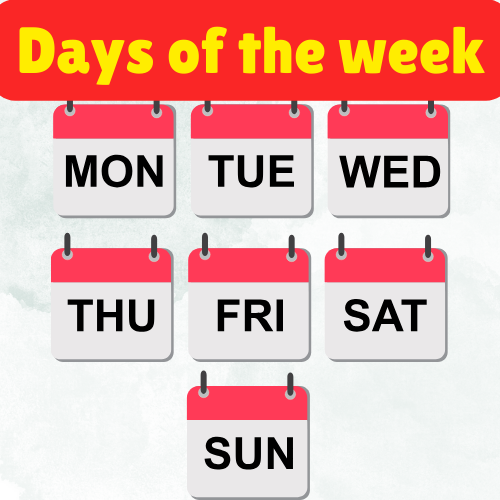

Welcome to our intermediate English lesson on the days of the week! Understanding the days of the week is crucial for scheduling, planning, and everyday communication. In this lesson, you will learn the names of the days of the week and their significance. Let's get started!
Lesson Content:
Introduction to the Days of the Week:
In this lesson, we will introduce the seven days of the week and their common associations.
The Seven Days:
Monday: The first day of the week, often associated with the start of work or school.
Tuesday: The second day of the week, known for being a productive day.
Wednesday: The third day of the week, often referred to as "hump day" as it marks the midpoint.
Thursday: The fourth day of the week, commonly associated with anticipation for the upcoming weekend.
Friday: The fifth day of the week, celebrated as the start of the weekend for many.
Saturday: The sixth day of the week, typically a day off work or school for relaxation and leisure.
Sunday: The seventh day of the week, observed as a day of rest or religious significance in many cultures.
Exercises and Activities:
Practice the Days of the Week:
Repeat the names of the days in order.
Write sentences using each day (e.g., "I have a meeting on Monday.", "We go to the gym on Wednesday.").
Welcome to our intermediate English lesson on the days of the week! Understanding the days of the week is crucial for scheduling, planning, and everyday communication.
In this lesson, you will learn the names of the days of the week and their significance.
Let's get started! Lesson Content: Introduction to the Days of the Week: In this lesson, we will introduce the seven days of the week and their common associations.
The Seven Days: Monday: The first day of the week, often associated with the start of work or school.
Tuesday: The second day of the week, known for being a productive day.
Wednesday: The third day of the week, often referred to as "hump day" as it marks the midpoint.
Thursday: The fourth day of the week, commonly associated with anticipation for the upcoming weekend.
Friday: The fifth day of the week, celebrated as the start of the weekend for many.
Saturday: The sixth day of the week, typically a day off work or school for relaxation and leisure.
Sunday: The seventh day of the week, observed as a day of rest or religious significance in many cultures.
Exercises and Activities: Practice the Days of the Week: Repeat the names of the days in order.
Write sentences using each day (e.g., "I have a meeting on Monday.", "We go to the gym on Wednesday.").
|
|

MondayMonday |

TuesdayTuesday |

WednesdayWednesday |

ThursdayThursday |

FridayFriday |

SaturdaySaturday |

SundaySunday |

days of the weekdays of the week |

weekweek |

dayday |

startstart |

productiveproductive |

hump dayhump day |

anticipationanticipation |

weekendweekend |

relaxationrelaxation |

leisureleisure |

restrest |

religious significancereligious significance |

ExamplesExamples |

MondayMonday |

I have class on Monday.I have class on Monday. |

TuesdayTuesday |

We have a meeting on Tuesday.We have a meeting on Tuesday. |

WednesdayWednesday |

Wednesday is the midpoint of the week.Wednesday is the midpoint of the week. |

ThursdayThursday |

I'm excited for Thursday because it's almost the weekend.I'm excited for Thursday because it's almost the weekend. |

FridayFriday |

We usually go out for dinner on Friday.We usually go out for dinner on Friday. |

SaturdaySaturday |

Saturday is my favorite day because I can sleep in.Saturday is my favorite day because I can sleep in. |

SundaySunday |

We attend church every Sunday.We attend church every Sunday. |
Great job! You have now learned the seven days of the week in English and their common associations.
Practice using the days of the week in your conversations and writing to become more familiar with them.
Understanding the days of the week will help you plan and discuss your weekly activities more effectively.